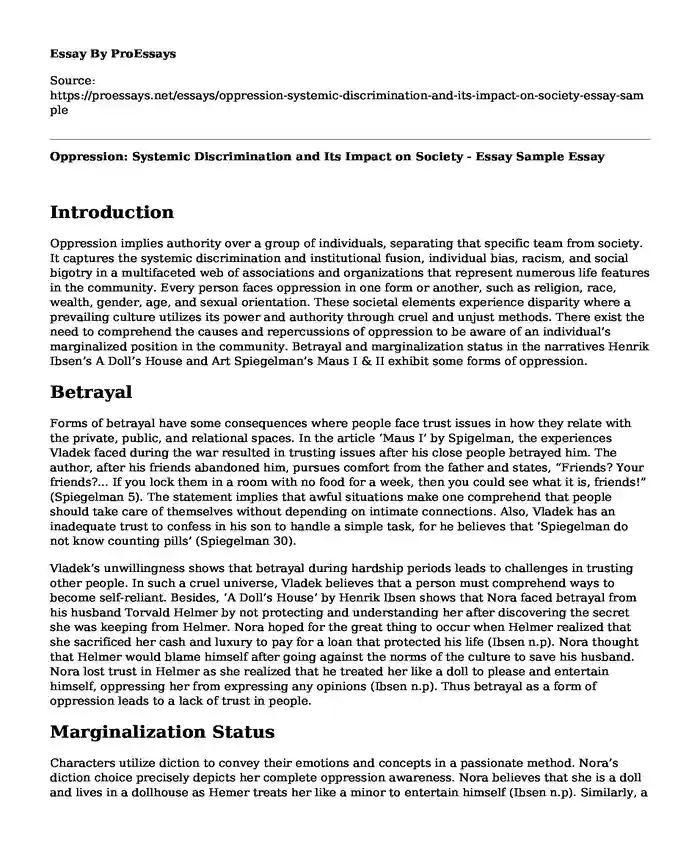Introduction
Oppression implies authority over a group of individuals, separating that specific team from society. It captures the systemic discrimination and institutional fusion, individual bias, racism, and social bigotry in a multifaceted web of associations and organizations that represent numerous life features in the community. Every person faces oppression in one form or another, such as religion, race, wealth, gender, age, and sexual orientation. These societal elements experience disparity where a prevailing culture utilizes its power and authority through cruel and unjust methods. There exist the need to comprehend the causes and repercussions of oppression to be aware of an individual’s marginalized position in the community. Betrayal and marginalization status in the narratives Henrik Ibsen’s A Doll’s House and Art Spiegelman’s Maus I & II exhibit some forms of oppression.
Betrayal
Forms of betrayal have some consequences where people face trust issues in how they relate with the private, public, and relational spaces. In the article ‘Maus I’ by Spigelman, the experiences Vladek faced during the war resulted in trusting issues after his close people betrayed him. The author, after his friends abandoned him, pursues comfort from the father and states, “Friends? Your friends?... If you lock them in a room with no food for a week, then you could see what it is, friends!” (Spiegelman 5). The statement implies that awful situations make one comprehend that people should take care of themselves without depending on intimate connections. Also, Vladek has an inadequate trust to confess in his son to handle a simple task, for he believes that ‘Spiegelman do not know counting pills’ (Spiegelman 30).
Vladek’s unwillingness shows that betrayal during hardship periods leads to challenges in trusting other people. In such a cruel universe, Vladek believes that a person must comprehend ways to become self-reliant. Besides, ‘A Doll’s House’ by Henrik Ibsen shows that Nora faced betrayal from his husband Torvald Helmer by not protecting and understanding her after discovering the secret she was keeping from Helmer. Nora hoped for the great thing to occur when Helmer realized that she sacrificed her cash and luxury to pay for a loan that protected his life (Ibsen n.p). Nora thought that Helmer would blame himself after going against the norms of the culture to save his husband. Nora lost trust in Helmer as she realized that he treated her like a doll to please and entertain himself, oppressing her from expressing any opinions (Ibsen n.p). Thus betrayal as a form of oppression leads to a lack of trust in people.
Marginalization Status
Characters utilize diction to convey their emotions and concepts in a passionate method. Nora’s diction choice precisely depicts her complete oppression awareness. Nora believes that she is a doll and lives in a dollhouse as Hemer treats her like a minor to entertain himself (Ibsen n.p). Similarly, a doll never leaves the house; hence the author used this imagery to show that men utilize their power and authority, oppressing, controlling, and trapping women. In ‘A Doll’s House’ Nora recognizes that Helmer always traps and rules her in the house because the patriarchal believes that women are simply objects meant for a man’s desire and must follow all of their orders (Ibsen n.p). Nora’s diction and symbolism demonstrate a much profound and well-established awareness of her oppression.
In ‘Maus I’ Spiegelman discloses that his father tries to remove a constant prompt of Anna’s implication to Vladek due to the pain of getting reminded that Anna was not in his life anymore. In his condition of heartache and despair, he burned Anna’s journals regardless of Anna motivating Spiegelman to read the notes. The author describes Vladek as a “murderer” (Spiegelman 159). Vladek “murdered” the prevalent reminder that he consistently worked and lived for Anna as well as liven during the Holocaust. Vladek’s activities infuriated Spiegelman, making him shout at his father since Anna’s notebooks would have offered extra understanding into the experiences a person would undergo during the Holocaust. Thus, the emotions and ideas of Nora and Spiegelman show that they have experienced oppression in society.
Conclusion
When people face systematic subjection to political, social, and cultural degradation, they tend to belong to a particular social group hence facing oppression. These lead to structures of subservience and power and correspondingly beliefs of dominance and inferiority. For instance, the ‘Maus’ by Art Spiegelman demonstrates the cruelty observed by the Jews in the Holocaust. Spiegelman attempts to discover how numerous characters like Vladek tried to utilize all the nearby techniques to survive the brutality of the Nazis in Germany. Besides, ‘A Doll’s House’ emphasizes the inequality experienced mostly in marriages where women are regarded as the minors of the house. Inequality is a technique of oppression that enhances male chauvinism. Marginalization is the product of ideas that establish deviancy, inferiority, and abnormality. Social and political injustices result in inequities such as the inadequate power distribution and numerous methods of intimidation utilized to preserve those power disparities. Thus oppression rises due to the impacts of societal customs, rules, and unchallenged assumptions.
Works Cited
Ibsen, Henrik. ‘A doll’s house.’ Dover, 2008,
https://www.gutenberg.org/files/2542/2542-h/2542-h.htm. Accessed 2020, August 26.
Spiegelman. A. ‘Maus I.’ A survivor’s tale, Pantheon Books, pp. 4-159, https://uniteyouthdublin.files.wordpress.com/2016/01/maus-a-survivors-tale-my-father-bleeds-history-by-art-spiegelman.pdf Accessed 2020, August 26.
Cite this page
Oppression: Systemic Discrimination and Its Impact on Society - Essay Sample. (2023, Nov 16). Retrieved from https://proessays.net/essays/oppression-systemic-discrimination-and-its-impact-on-society-essay-sample
If you are the original author of this essay and no longer wish to have it published on the ProEssays website, please click below to request its removal:
- Ferguson Missouri Events in August 2015
- Research Paper Example on Internet Addiction
- Essay Sample on DUI Checkpoints
- Black Power Movement Essay Example
- The Spokane Reservation: Sherman Alexie's Poignant Stories of Native American Struggles
- Annotated Bibliography on Helicopter Parenting: Risks & Consequences
- Essay Example on John and Mary's Happy Ending: Love, Marriage, Family, and Death







